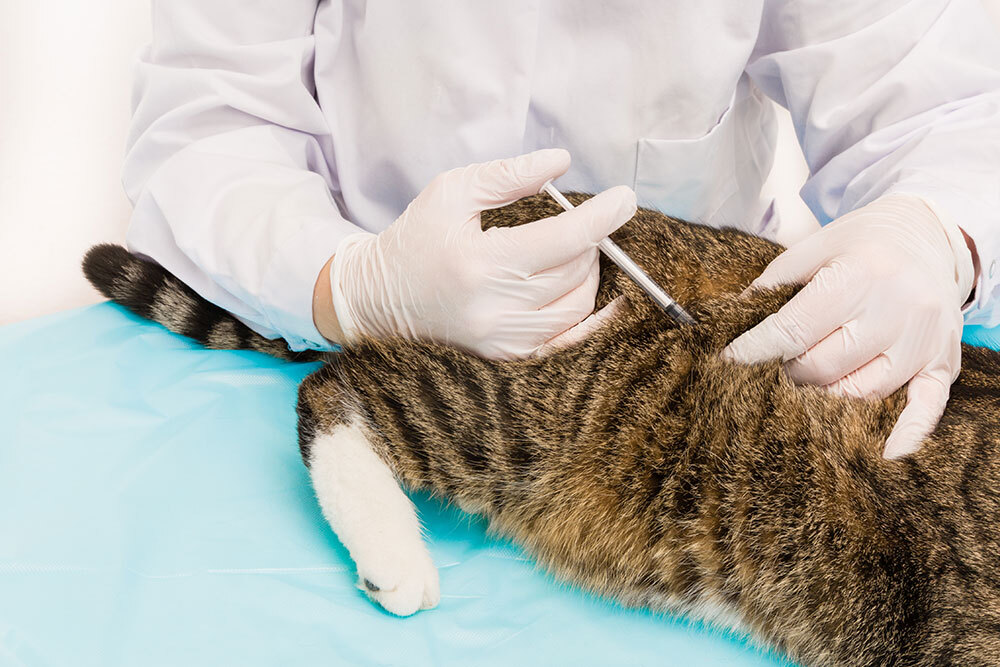Understanding the Importance of Pet Vaccinations in Elmira, Ontario
Why Vaccinate Your Pets?
Vaccinating your pets is essential for their long-term health and for the well-being of the broader pet community in Elmira. Vaccines work by training the immune system to recognize and combat disease-causing organisms. They introduce harmless components of pathogens, allowing the immune system to develop a defense without the risk of illness.
Vaccinations are a crucial part of herd immunity, which helps prevent the spread of diseases among animals and even from animals to humans. This is especially important in Elmira, where pets frequently interact with wildlife and other animals, increasing the risk of diseases like rabies, a fatal zoonotic disease that spreads between species.
Diseases Prevented by Vaccines
Vaccines protect against highly contagious and often fatal diseases, such as:
- Rabies – Affects the nervous system, leading to neurological issues and death.
- Distemper – Causes severe respiratory, gastrointestinal, and neurological symptoms.
- Parvovirus – Highly contagious, leading to dehydration, vomiting, and bloody diarrhea.
- Feline Leukemia Virus (FeLV) – A major cause of death in cats, affecting the immune system.
- Bordetella (Kennel Cough) – A common respiratory infection in dogs that spread in social settings.
Failing to vaccinate puts pets at risk of unnecessary suffering, costly treatments, and reduced lifespan.
The Role of North Waterloo Veterinary Hospital in Your Pet’s Health
At North Waterloo Veterinary Hospital, we tailor vaccination plans to suit your pet’s age, breed, health status, and lifestyle. Our experienced team provides:
- Comprehensive health assessments
- Personalized vaccination schedules
- Guidance on vaccine safety and side effects
Contact us today to schedule a vaccination consultation.
Vaccinations Through Different Life Stages
Puppy & Kitten Vaccination: Building a Strong Foundation
Vaccination should begin at 6–8 weeks old, with booster shots every 3–4 weeks until at least 16 weeks. This period is crucial, as young pets have weaker immune systems and are highly vulnerable to infections.
Core Vaccines for Puppies & Kittens
- Dogs: Distemper, Adenovirus, Parvovirus, Rabies
- Cats: Panleukopenia (FPV), Herpesvirus, Calicivirus, Rabies
Lifestyle-Based Vaccines (Non-Core)
- Outdoor Cats: Feline Leukemia Virus (FeLV)
- Social Dogs: Bordetella (Kennel Cough), Canine Influenza
- Adventure Dogs: Lyme Disease, Leptospirosis
For more on your pet’s life-stage needs, visit:
Understanding Your Dog’s Life Stages
Understanding Your Cat’s Life Stages
Adult Pet Vaccinations: Maintaining Immunity
As pets grow, their immunity wanes over time, making booster shots critical. Dogs and cats typically require boosters every 1–3 years, depending on the vaccine and exposure risks.
- Core Vaccines: Continue to protect against deadly diseases.
- Non-Core Vaccines: Recommended based on lifestyle (e.g., dog park visits, travel, or outdoor exposure).
Senior Pet Vaccinations: Special Considerations
Aging pets require a careful balance of protection and immune system support. Senior pets may:
- Have weaker immune responses, needing more frequent boosters.
- Experience increased side effects from vaccines, requiring a personalized approach.
- Need regular health screenings to monitor vaccine effectiveness.
Routine check-ups allow veterinarians to adjust vaccination plans based on age-related health changes.
Addressing Common Concerns About Pet Vaccines
Are Pet Vaccines Safe?
Vaccines undergo rigorous testing before approval. A common myth is that vaccines can cause the disease they prevent, but this is false. Vaccines contain inactive or weakened pathogens that cannot cause illness.
- Mild side effects (fatigue, swelling at the injection site) are temporary.
- Severe reactions (anaphylaxis) are extremely rare and treatable.
For more details, read:
Vaccinations for Pet Owners – AVMA
Understanding Vaccine Reactions & Side Effects
Most side effects are mild and resolve within 24 hours:
- Common: Slight swelling, mild fever, reduced appetite.
- Rare: Vomiting, hives, difficulty breathing (seek immediate care).
Monitoring your pet post-vaccination ensures prompt treatment of any concerns.
Customizing Vaccination Plans for Your Pet
Factors That Affect Vaccine Schedules
- Indoor vs. Outdoor Living: Outdoor pets face higher exposure risks.
- Frequent Travel: Pets that travel or visit boarding facilities may need additional protection.
- Pre-existing Conditions: Some pets require adjusted vaccination plans.
Book an appointment to create a customized vaccine schedule for your pet.
The Cost of Vaccinations: A Smart Investment
While vaccines have an upfront cost, they save thousands in emergency treatments.
- Parvovirus Treatment: Can cost $1,500–$5,000, while the vaccine is under $100.
- Rabies Treatment: Fatal if not prevented—vaccination is the only protection.
Investing in preventive care saves money and protects your pet’s well-being.

Preparing for Your Pet’s Vaccination Appointment
Questions to Ask Your Veterinarian
- What vaccines does my pet need based on lifestyle?
- What side effects should I watch for?
- How often should my pet get booster shots?
Special Considerations for Cats
Cats have specific vaccination needs that differ from dogs. Learn more:
What Should I Know About My Cat’s Vaccinations?
Protecting Elmira’s Pets Together
The Role of Community Vaccination
Every vaccinated pet reduces the spread of preventable diseases, making Elmira safer for all animals and people.
Stay Proactive: Keep Your Pet’s Vaccinations Up to Date
- Regular veterinary check-ups ensure lasting immunity.
- Proper nutrition, hygiene, and parasite prevention strengthen the immune system.
By staying informed, you’re protecting your pet, your community, and future generations of animals.







Leave A Comment